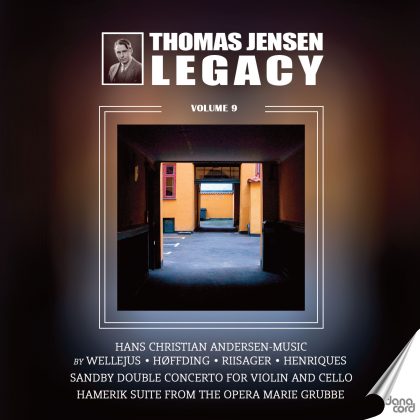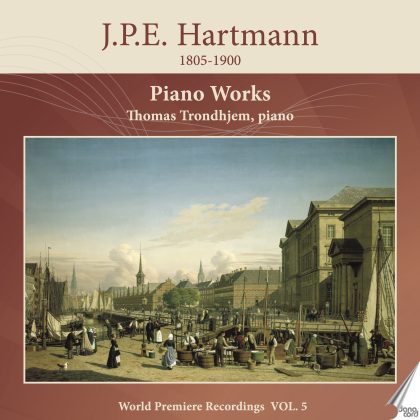Review (BBC Music Magazine 16 April 2024):
Conductor Thomas Jensen was a vital precense in Danish music from the 1930s to the 60s, a cellist who played for Sibelius, and a student of Carl Nielsen who became one of the composer’s great evangelists. The Danacord label has been releasing Jensen’s commercial and radio recordings, and Volume 20 offers no fewer than 12 Danish Composers: from overtures by Kuhlau and Gade with the Tivoli Orchestra in the 1940s, to live broadcasts of the Danish Radio Symphony Orchestra in Riisager’s suite Paradise of Fools, and a thrilling traversal of Holmboe’s Seventh Symphony. Decent remastering, a huge variety of styles – and a vital window on Danish Music.
(Danacord DACOCD930;2CDs) ★★★★
Friedrich Kuhlau
1. Elverhøj Ouverture, Op. 100
Niels W. Gade
2. Efterklang af Ossian. Ouverture Op. 1
J.P.E. Hartmann
3. Gudernes Triumfmarch fra balletten “Thrymskviden”
P.E. Lange-Müller
4. Forspil til “Renæssance”
Knudåge Riisager
Slaraffenland, Op. 33
Suite 1
5. Prinsesse Sukkergodt
6. Dovendidrikernes Polka
7. Vagtparaden
8. Punktum Finale
Vagn Holmboe
Symphony No. 7, Op. 50
9. Allegro con fuoco –
10. Intermedio I: Andantino –
11. Adagio –
12. Intermedio II: Andantino –
13. Presto
14. Intermedio III: Andantino
15. Coda
Svend Erik Tarp
“Mosaik”, miniature suite
16. Harmonika
17. Skalmeje
18. Den gamle violin
19. Koral
20. Sækkepibe
21. Tempo di valse
22. Galopade
Knud Høgenhaven
23. Pastorale in F for String Orchestra, Op. 16
24. Norsk Folketone for String Orchestra, Op. 26
CD 2
Knudåge Riisager
1. Qarrtsiluni Op. 36
Jørgen Jersild
2. Pastorale for Strygeorkester
Svend Erik Tarp
3. Lystspilouverture
Emil Reesen
4. Grønlandsk Folketone
Erling Brene
Concerto for Viola and Orchestra, Op. 47
5. Præludium. Allegro – Allegro non troppo
6. Largo sostenuto e lamentoso
7. Allegro
Flemming Weis
Sinfonia proverbiorum – Efter Salomons ordsprog
8. Fili mi, si susce peris sermones meos
9. Beatus homoqui invenit sapientiam
10. Conserva, fili mi, praecepta patris tui
Emil Reesen
11. Fantasy on Danish Christmas Melodies
Thomas Jensen Legacy, Vol. 20 ©
By Martin Granau/Peter Quantrill
The present set affords an opportunity to appreciate Thomas Jensen’s unprejudiced advocacy of Danish composers writing across a wide spectrum of styles, comparable in this regard to the contemporary work of Sir Adrian Boult in the UK, Roger Désormière in France and Hans Rosbaud in Germany. Tracks 1-4 on CD1 were recorded during the wartime German occupation of Denmark. The Tivoli Concert Hall Orchestra had been regarded as a more significant concert-giving organisation than either the Royal Chapel or Danish Radio. During the summer season before the war, the Tivoli orchestra presented three daily one-hour concerts of light orchestral pieces, and on Saturdays afternoons they played ‘Symphonies’ of more substantial fare. This was the only one of the week’s concerts granted a rehearsal period.
This schedule hardly altered during the war, though music became more of a rallying point for national sentiment. It is therefore no wonder that the four pieces presented here are all Danish (allowing for Kuhlau as an immigrant from Germany). Tivoli concerts continued to draw crowds during the occupation, until the fateful night of June 24-25, 1944, when the Germans blew up the main concert hall, the smaller concert hall, the Glass Hall, and large parts of Tivoli’s archive. In the days after this sabotage, the orchestra’s musicians and other employees in Tivoli worked at high pressure to disinter what could be rescued from the ruins. Much went up in smoke, such as the complete manuscripts of the orchestra’s former conductorcomposer, H.C. Lumbye.
Elverhøj (The Elf Hill) enjoys the status of a national play in Denmark. It was written by Johan Ludvig Heiberg and first produced in 1828, for which Kuhlau produced a good deal of incidental music, opening with this Overture. The action is based partly on legends of the elf king from the region of Zealand, partly on heroic accounts of Denmark’s King Christian the Fourth. The king is represented in the overture by the appearance (at 6’05”) of a song (‘Kong Christian stod ved højen mast’) which is hardly less of a national anthem than ‘Der er et yndigt land’. Indeed, it was common practice until recently for Danish audiences to stand up at this point in the overture, in homage to their nation and their royalty.
Efterklang af Ossian (Echoes of Ossian) is Niels W. Gade’s famous opus 1, which he submitted to the Musikforeningen’s composer competition in 1840. Gade was an ambitious 24-year-old when he sent two orchestral scores to Mendelssohn, then conductor of the Leipzig Gewandhaus Orchestra, in the hope of performance. Both Echoes of Ossian and the First Symphony won favour with the fastidious ear of the older man, who not only conducted them but invited Gade to Leipzig. The young Danish composer stayed in the city and made so positive an impression on Mendelssohn and his circle (including Robert and Clara Schumann) that he became a teacher at the conservatoire and an assistant conductor of the Gewandhaus. After the outbreak of war in 1847-48, Gade returned home to Copenhagen, where he both rebuilt the Musikforeningen and established the conservatory in Copenhagen, later the Royal Danish Music Conservatory.
The narrative over the overture concerns a legendary Scottish king, Ossian, but Gade’s idiom shares a distinctly Nordic flavour with the music of J.P.E. Hartmann, with the heroic main theme being inspired by a well-known Danish folk song about Ramund (‘Ramund, he was a better man’). The work was first performed in 1841 and led to Gade’s international breakthrough as a composer.
RELEASE DATE: November 2023
CATALOGUE NUMBER: DACOCD 930
EAN: 5709499930007




